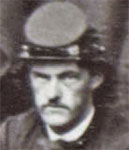 Open main menu
Open main menu
 Open main menu
Open main menu

BATTERY D, SECOND UNITED STATES ARTILLERY,
CAMP IN THE FIELD,
NEAR WILLIAMSPORT, MARYLAND
September 22, l862.
Colonel HENRY JACKSON HUNT,
Chief of Artillery, Army of the Potomac, United States Army.
SIR : I have the honor to submit the following report of the part taken by this battery in the action near Sharpsburg, Maryland on September 17.
The battery which had marched from Crampton's Pass in the morning arrived in the woods and halted at that point where General Newton's Brigade was lying about 2 o'clock p.m.
In about half an hour the battery was ordered forward by Captain Upton, Chief of Artillery of the Division, and went into battery to the left of the road1 and right of the graveyard2.
I opened, with spherical case, on to the right of the schoolhouse3, with good effect.
The enemy's sharpshooters took positions in and near the schoolhouse and became very annoying, but were forced to seek shelter in the woods, by several well-directed round shot which passed entirely through the house.
At that moment, a Rebel 20-pound Parrott4 battery began to fire on the battery from a position directly in front and at an estimated distance of 2,000 yards.
They fired shot and shell with remarkable precision, inflicting, however, slight damage upon the battery, owing to the superior position it occupied.
I received an order to move out of battery, under cover, which I did, relieved by Hexamer's First New Jersey Parrott Battery.
Soon after meeting Captain Upton, I requested and obtained his permission to again occupy the position, Captain Hexamer having been ordered to the left of the company.Having been ordered not to open fire, the battery remained silent until suddenly a rifled battery in position near the place where the first one had engaged us was situated, commenced to fire solid shot and case, which seemed to be directed against the right half of the battery and the brigade of General Newton, on our left.
The fire was immediately returned by this battery firing solid shot at our highest attainable elevation.
I observed that all our shots fell short, and being satisfied that ammunition would only be wasted by continuing to fire, I ordered the battery to cease firing and reported the results of my observations to Captain Upton, who ordered Captain Wolcott's First Maryland 3-inch Ordnance Battery to relieve me.
The battery moved to the left and out of artillery fire and remained in a comparatively safe position until ordered by Captain Upton to take position on a crest of a hill near the brigade of Colonel Irwin, of the Seventh Maine.
Arriving at the place designated, I relieved three guns from Captain Wolcott, which were there in battery and coming into action, commenced to fire spherical case into an orchard about 700 yards distant, and which was reported to be filled with a brigade of Rebels which had driven the gallant Seventh Maine from the orchard a few minutes previous.
The fire from the battery had been very rapid, and the case burst as could most have been desired.
The firing ceased in about half an hour, although the battery remained in the same position until 10 o'clock p.m.
I have since earned from officers of our own infantry, and from those who visited the orchard afterwards, that the fire from the battery was effective in the extreme, the ground being covered with Rebel dead and the trees bearing the marks of a very severe fire. I also learned from a Rebel officer whom I saw on September 18, under a flag of truce, that the Rebel brigade occupying the orchard at the time the battery commenced firing were very badly cut up and forced to retire.
During the time we were in our last position the battery was under a severe fire from the enemy's sharpshooters, which resulted only in wounding one man and horse.
This result I attribute solely to the judgment of Captain Upton, to whom I consider due the greatest credit for ordering the battery forward to a very advanced position at a critical moment and assigning it a position, remarkably alike for its advantages for effecting the desired object and its security from mini balls.
I cannot too highly commend the officers, Lieutenants Borrowe and Warner of the battery, and Lieutenant Fitzhugh, First New York Volunteer Artillery and Lieutenant Pendleton, First [West] Virginia Volunteer Artillery, attached, for their gallantry and coolness during the action.
The non-commissioned officers and men behaved nobly and offered numerous proofs of bravery under a heavy artillery fire and a most galling fire from the Rebel sharpshooters, to which they were exposed.
EDWARD B. WILLISTON,
First Lieutenant, Second United States Artillery,
Commanding Battery D.
Source: Janet Hewett, ed., The Supplement to the Official Records of the Union and Confederate Armies, 100 Volumes in 3 Parts, Wilmington (NC): Broadfoot Publishing Company, 1994-2001; Part 1, Vol. 3, pp. 519 - 522. From the Henry Jackson Hunt Papers, Library of Congress.
1 The Smoketown Road.
2 Probably the Mumma family cemetery.
3 Probably the Dunkard Church.
4 There were no Confederate batteries known to be equipped with 20 Pound Parrotts at Sharpsburg. It may have been the 10-pound Parrots of Captain Pogue's Rockbridge Artillery or another of the batteries of rifles on the high ground west of the East Woods.